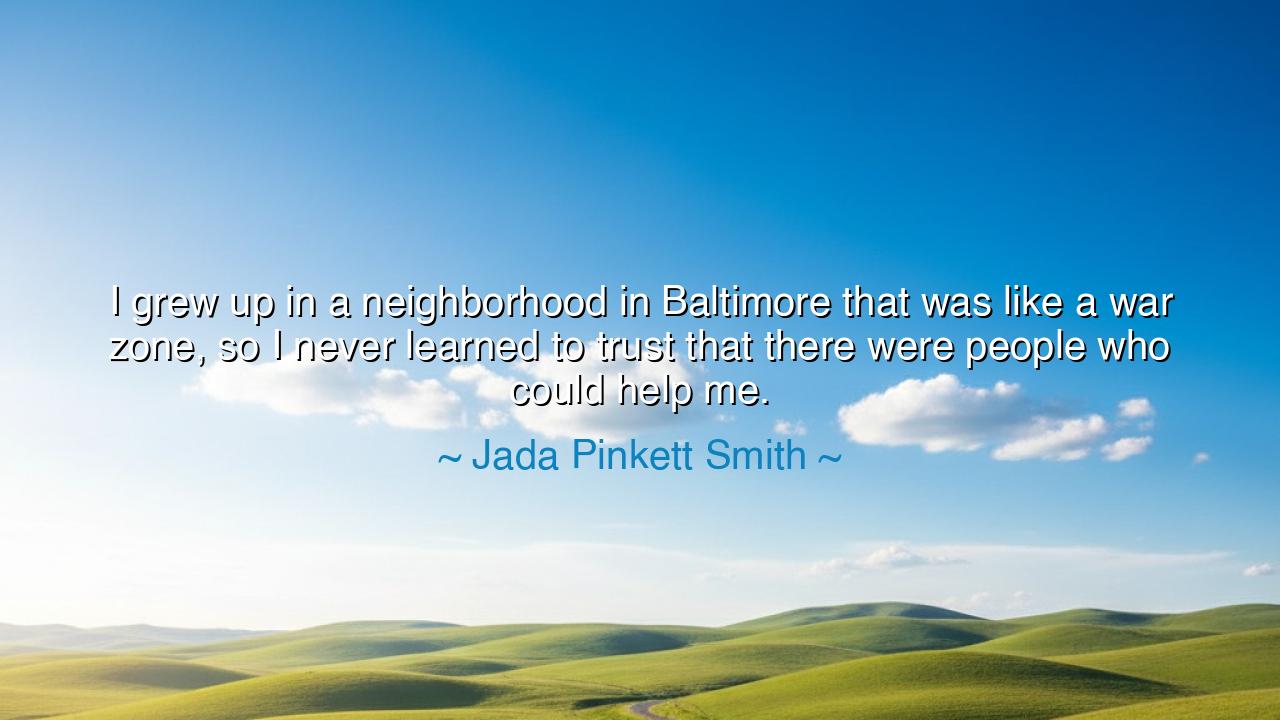
I grew up in a neighborhood in Baltimore that was like a war
I grew up in a neighborhood in Baltimore that was like a war zone, so I never learned to trust that there were people who could help me.






The words of Jada Pinkett Smith ring with both sorrow and strength: “I grew up in a neighborhood in Baltimore that was like a war zone, so I never learned to trust that there were people who could help me.” In this confession we hear not only the story of one woman’s childhood, but the echo of countless souls raised amid hardship. It is the voice of a child who walked in shadows, learning survival before she learned safety, and suspicion before she knew trust. Her words remind us that the soil in which a person is planted shapes their earliest roots—and some grow in soil hardened by struggle.
The ancients knew that environment molds the spirit. A child raised in peace learns gentleness; a child raised in conflict learns vigilance. Just as the olive tree, battered by winds, bends but does not break, so too do those who grow in a war zone—whether of guns, poverty, or despair—carry within them both resilience and wounds. Jada’s neighborhood was her battlefield, and every street corner a test of survival. Such places do not easily teach one to lean on others, for often help seems absent, and to trust the wrong person can bring ruin.
Yet even in this bleak vision, there is a hidden flame. For those who emerge from such crucibles often carry a depth of strength unknown to those who have lived only in comfort. They learn to fight for themselves, to carve a path when none is given, to endure with a spirit tempered like steel. But the price is heavy: an inability to believe that others will stand beside them. And without trust, the burden of life becomes heavier than it must be.
History gives us many who have walked this path. Consider Frederick Douglass, born into slavery in Maryland, not far from where Jada’s Baltimore stands. He, too, grew in a world where cruelty was the norm and trust could mean betrayal. Yet from those brutal beginnings, he forged his spirit into eloquence and action, becoming a voice that thundered against injustice. His life teaches us that from the harshest neighborhoods of existence can rise the strongest champions—but only if they learn, in time, to trust others and to build bonds of solidarity.
The meaning of Jada’s words, then, is twofold: they reveal the wound of mistrust, but also hint at the resilience of one who survived despite it. They remind us that environments shaped by violence and poverty are not just landscapes—they are classrooms that teach lessons of suspicion and endurance. Yet they also challenge us: if such places breed mistrust, then it is the duty of society, of families, of communities, to plant seeds of help, hope, and trust where once there were only walls.
The lesson is clear: though mistrust may be born of necessity, life cannot flourish fully without learning to trust again. One hand cannot carry the weight of the world; only when hands join together can burdens be lifted. To those who have endured their own war zones, whether on streets, in homes, or in hearts—do not let mistrust become your prison. Learn, slowly, to see that not all who approach do so with harm. There are allies in every age, though they may be few.
Practical actions flow from this wisdom: if you have grown in hardship, seek out communities, mentors, or friends who prove themselves over time. Test their loyalty, but do not close your heart forever. And if you are one who has known peace, extend your hand to those who have not, showing through action that trust can be rebuilt. In this way, the world itself may become less of a war zone, and more of a place where children grow not in fear, but in hope.






GDGold D.dragon
I find this quote deeply moving because it sheds light on the emotional cost of growing up in a tough environment. Trust is such an essential part of human relationships, and not learning to trust can leave lasting scars. What does it take for someone who’s grown up in such conditions to learn that not everyone is out to hurt them? Can therapy or positive life experiences help break down those barriers?
TKle tuan kiet
This quote paints a vivid picture of the challenges people face when their environment teaches them that trust is dangerous. It’s hard to imagine growing up without that basic belief in others' goodness. How do individuals in these situations learn to trust, if at all? Is it something that can be cultivated over time, or is it a lifelong barrier to forming connections?
NNam
Jada Pinkett Smith’s statement highlights the harsh reality of living in an environment where safety and support seem nonexistent. It makes me wonder about the long-term effects of growing up without trust in others. How do we rebuild that sense of trust, both in people and systems, if it’s never been part of our experience? Is it possible to unlearn the survival mentality and replace it with hope and trust?
HLluong hieu lam
This quote really made me think about how our environments shape our ability to trust others. Growing up in a place where survival is the priority must make it incredibly hard to believe that people can be trusted. How much do our surroundings influence our ability to form meaningful, trusting relationships? Can someone who grows up in such conditions ever truly learn to trust, or does that skepticism become part of their identity?